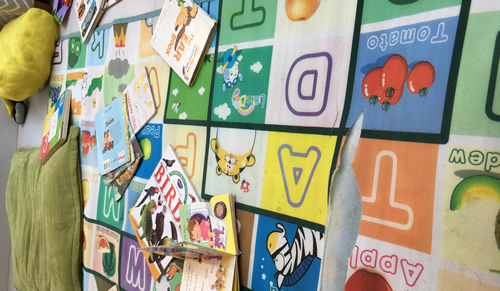Children with special needs face learning challenges due to COVID-19
While adjusting to the online learning system has been hard for students of various grades, this dramatic change has made it uniquely hard for students with special needs.
Umutesi Lisa is an assistant teacher in the special needs department. She assists children of various ages, from nursery to high-school. Living with special needs means that an individual whether a child or a young adult, requires extra help or extensive care when it comes to academic learning. Usually, these children struggle with having low concentration, or have other learning disabilities. Due to COVID-19, schools had to close and move online to help reduce the spread of the virus. So, how did this change impact the learning process of children with special needs ?
Umutesi shared that the children she helps, have to attend school physically in order to carry on with their learning although the learning materials are online. “The pandemic tremendously affected my work. It is now hard to connect with the students on a personal level. Before schools shut down, other students were there as well, and those with special needs were able to interact with others which improved their social skills. Currently, it is just the teachers in the special needs department and the children with special needs. Their social skills have declined as well as their interactions with their teachers. Additionally, it is harder when you have to socially distance and wear a mask while helping them learn. It is also hard on them emotionally because they feel less normal in comparison to the other students that are able to learn from home. It is difficult to help them understand that they are not being punished by being the only ones attending school physically rather than online.”
Umutesi went on to elaborate that even though the children are at school physically, the learning is still online because they receive the same learning materials as their classmates who are learning remotely. “Instead of finding each student in need of special education in their respective home, it is better to have them attend school physically. This is not only because there are not so many teachers in the special needs department that would be available for every student in their respective home, but also because the students are able to separate school from home. For a few children, it could get confusing and harder for them to learn if they are not in the appropriate environment.”
One of the children’s parent, whose child is 7 years old, shared that due to how young her daughter is, she is demotivated to attend school. “She enjoys school less now. It used to be easier to get her ready for school in the morning because she was excited to see her teachers and classmates. But now that the school is deserted, she dreads being in that environment.”
Umutesi added that these young children with special needs were used to being showed affection by their teachers but now they have to be told that it is best they keep a distance. “To greet the children, we would hug them so they feel welcomed and more connected with us. Unfortunately, due to the pandemic, we have to keep our distance which is very hard for the children to understand.”
But the impact of COVID-19 on the learning of these children is not solely negative at times. Umutesi shared that the children are able to focus more. “Even though they are not able to improve their social skills, it is easier for them to concentrate without the external distractions. When it is just me and the student, the learning process is slightly less challenging compared to when it would be me, the teacher, the student with a special need, and the rest of the class.”
Nonetheless, the positive aspect of this learning situation for the children with special needs is not obvious. Not only has this pandemic made it hard for students across the country to study in an environment designed for learning, students in need of special education are struggling to embrace their learning process as both adjustable and ‘normal’. Umutesi said that she is looking forward to schools opening again, and her students being able to talk to their friends around school again. She also hopes that seeing their schools empty, does not push these children to hate school, and make it harder for them to attend in the future.

